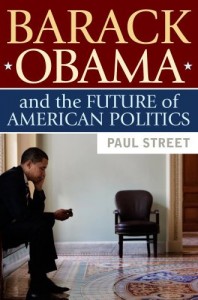 Purchase “Barack Obama and the Future of American Politics” on Amazon.
Purchase “Barack Obama and the Future of American Politics” on Amazon.
Many Americans believe Barack Obama represents a hopeful future for America. But does he also reflect the American politics of the past? This book offers the broadest and best-informed understanding on the meaning of the “Obama phenomenon” to date.
Paul Street was on the ground throughout the Iowa campaign, and his stories of the rising Obama phenomenon are poignant. Yet the author’s background in American political history allows him to explore the deeper meanings of Obama’s remarkable political career.
He looks at Obama in relation to contemporary issues of class, race, war, and empire. He considers Obama in the context of our nation’s political history, with comparisons to FDR, JFK, Bill Clinton, and other leaders. Street finds that the Obama persona, crafted by campaign consultants and filtered through dominant media trends, masks the “change” candidate’s adherence to long-prevailing power structures and party doctrines. He shows how American political culture has produced misperceptions by the electorate of Obama’s positions and values. Obama is no magical exception to the narrow-spectrum electoral system and ideological culture that have done so much to define and limit the American political tradition.
Yet the author suggests key ways in which Obama potentially advances democratic transformation. Street makes recommendations on how citizens can productively respond to and act upon Obama’s influence and the broader historical and social forces that have produced his celebrity and relevance. He also lays out a real agenda for change for the new presidential administration, one that addresses the recent failures of democratic politics.
This study differs from previous books on Obama in at least three ways: (1) Street’s determination to offer a balanced but critical assessment of the “Obama phenomenon” from a perspective shaped by years of engagement with Left theory and activism; (2) Street’s effort to understand the phenomenon in a deeply researched historical, societal, and institutional context, consistently relating Obama’s career and candidacy to the ongoing historical development and dilemmas of U.S. political culture; (3) Street’s ability to deepen his account by drawing on his considerable direct experience with the phenomenon over years as a civil rights researcher and advocate on the south side of Chicago (2000-2005) and as a campaign activist in Iowa during the long and critical Iowa primary (caucus) season of 2007-2008.
Currently an independent policy researcher, historian, and journalist based in Iowa City, Paul Street was the Director of Research and Vice President for Research and Planning at the Chicago Urban League from 2000 to 2005. He is the author of three previous books: Racial Oppression in the Global Metropolis: A Living Black Chicago History (New York: Rowman & Littlefield 2007); Segregated Schools: Educational Apartheid in the Post-Civil Rights Era (New York: Routledge 2005); and Empire and Inequality: America and the World since 9/11(Boulder: Paradigm 2004). Street has published a large number of articles, essays, reviews, and editorials in numerous outlets, including the Chicago Tribune; Journal of American Ethnic History; Journal of Social History; Mid-America; Chicago History; Review of Education; Pedagogy, and Cultural Studies; Studies in History and Politics; History of Education Quarterly; In These Time; Dissent; Capital City Times; Z Magazine; Black Commentator; Black Agenda Report; ZNet; AlterNet; Tom’s Dispatch; History News Network; and Monthly Review. Street has a doctorate in U.S. History from Binghamton University.
Reviews:
<”Street punctures widely held myths in this unflinching and unsentimental account of Obama’s centrist, corporate-friendly policies. But Street offers some saving grace here: a new Obama administration may oxygenate the grassroots movements that are the true architects of change, opening up space for hope.”<
—Charles Derber, Coauthor of Morality Wars and The New Feminized Majority
“All those interested in truth rather than seduction should read urgently this wise book by Paul Street, who peels away the mask of the ‘Obama phenomenon’ and reveals power as it is, not as many of us wish it to be.”
—John Pilger, Director of the film, The War on Democracy
“That the Obama phenomenon is of considerable significance in American social and political history should hardly be in doubt. But what exactly is it, and where might it lead? This lucid and penetrating book situates it firmly within the ‘corporate-dominated and militaristic U.S. elections system and political culture,’ explores in depth its substantive content and its limits, and draws valuable lessons about how these might be transcended in the unending struggle to achieve a more just and free society and a peaceful world. It is a very welcome contribution in complex and troubled times.”
—Noam Chomsky
“Barack Obama and the Future of American Politics is a much needed burst of clear, brisk conceptual air that cuts through the fog of fantasy and wish-fulfillment. His meticulously researched, carefully argued analysis of Obama’s career and his politics performs an important task of demystification. It is also an eloquent and bracing reminder that progressive agendas will not be advanced through vesting hopes and aspirations in candidate-centered politics, that there is no quick and easy substitute for the task of building a serious, institutionally grounded, working-class based political movement —from the bottom up and top down.”
—Adolph Reed Jr., University of Pennsylvania
” . . . Paul Street’s critique of the Democratic presidential frontrunner comes not from the right but from the progressive left. Once VP for Research and Planning at the Chicago Urban League, Street worked for the presidential campaign of John Edwards. His articles have appeared in the Chicago Tribune, Z Magazine, the Journal of Social History, and other periodicals. His book is required reading for progressives, but citizens from all corners, whether or not they agree, will find that Street’s thesis is carefully researched and documented, and well-argued.”
—Joe Taylor, ForeWord Magazine
